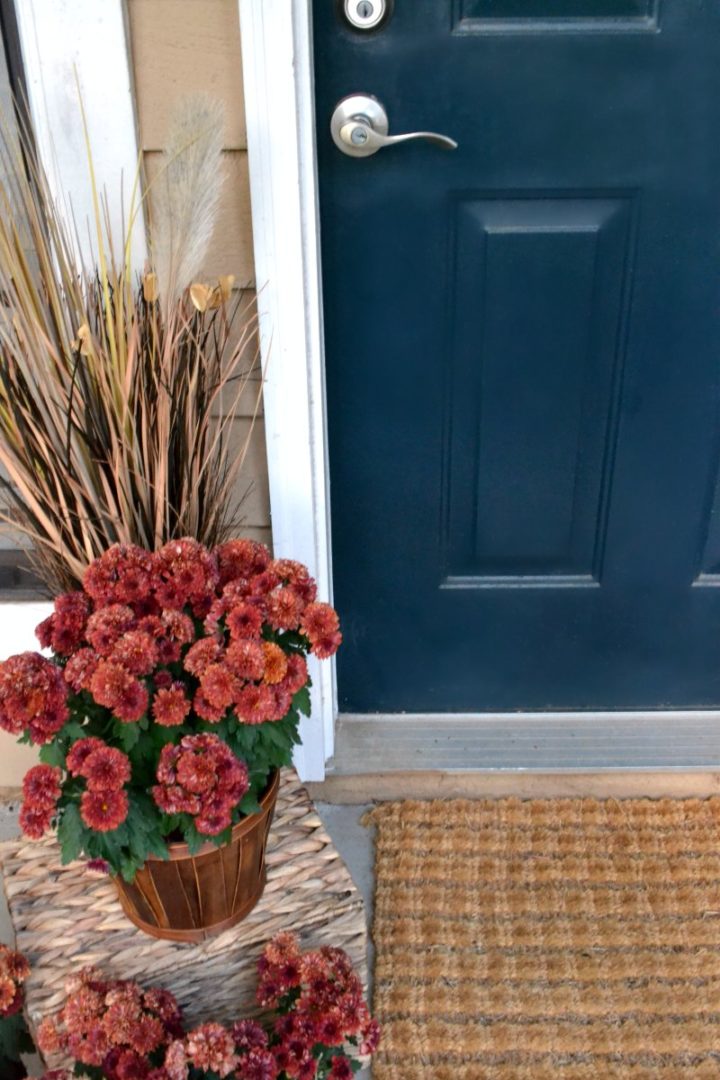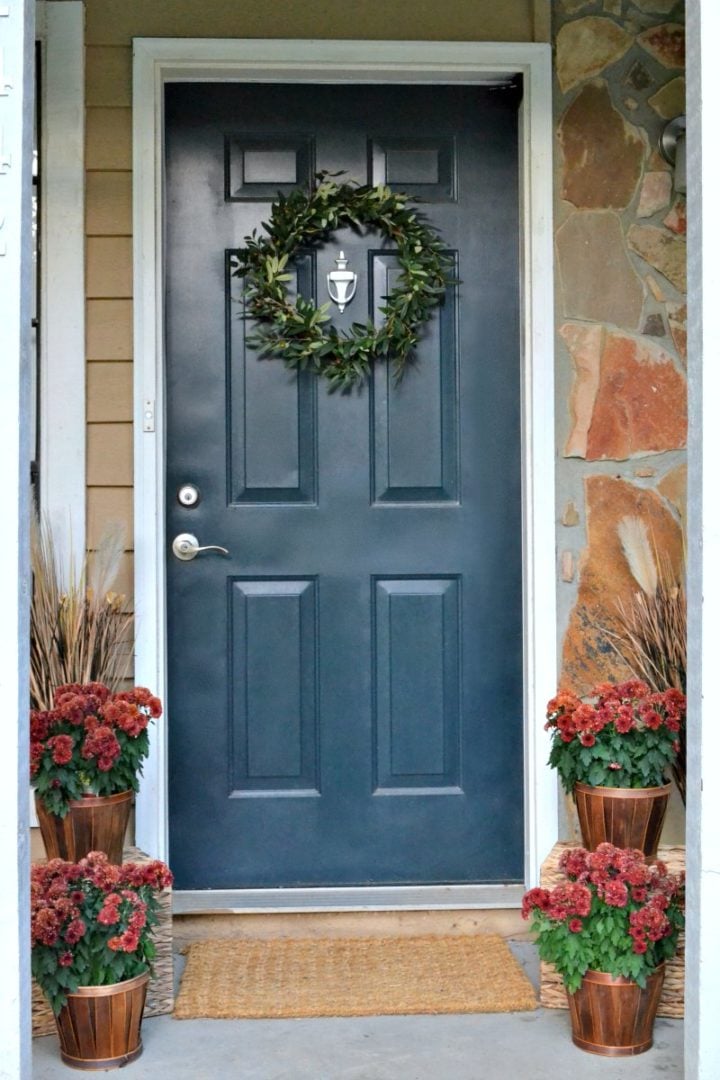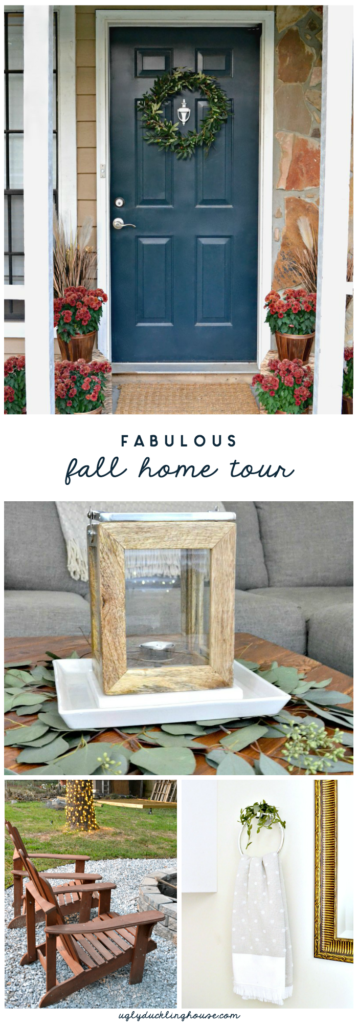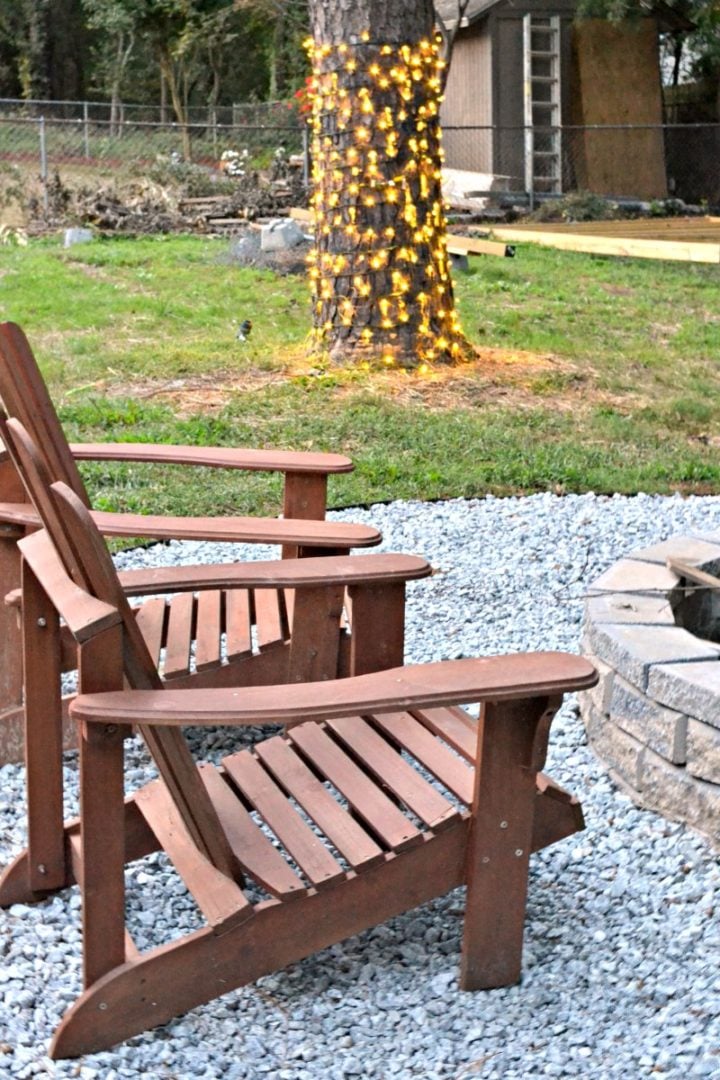Tips on how to remove a chain link fence in just an afternoon — plus how to fix a neighbor’s fence without spending a dime.
Over the last week, some of the biggest changes around the back yard had more to do with things being removed than things being added. I finally removed the chain link fence!

As you can see from the before photo, I got the idea when I was filling in the new back hedge line with mulch (for tips on how to save a LOT of money on gravel and mulch, check out this post). You can get some of the story from the photo (below) alone, but the backstory (at least the part where I’m trying to be a decent neighbor) is also a part of this, so I’ll address that first.
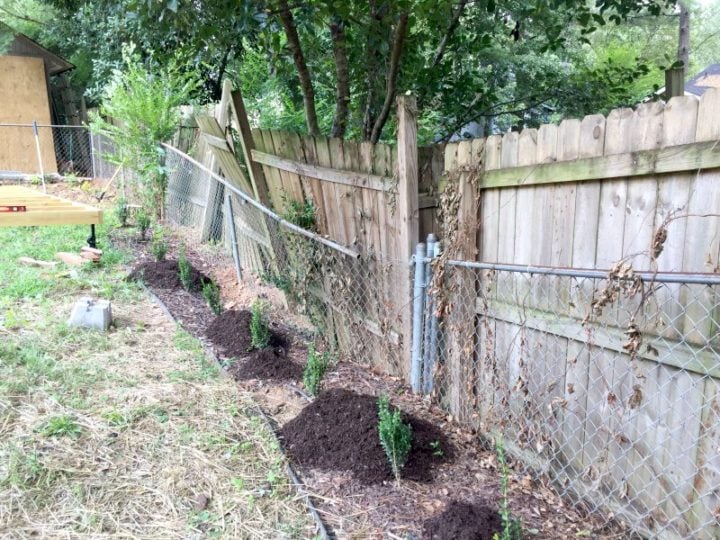
FYI, this post contains affiliate links, which serve to support this site a few cents at a time from tools/products I recommend. These do not increase your purchase price if you buy something from one of my recommendations. Thanks for supporting the UDH!
There are a number of things in the above photo making my eye twitch. One thing, obviously, is the chain link fence itself. There had also been an overgrowth of poison ivy from one neighbor’s yard, plants/weeds growing in between my fence and the neighbors’ that I could never seem to reach effectively, and oh yeah — one of my neighbor’s fences looked like shit.
Just so you know the whole layout/situation, my house is bordered by four neighbors — one on either side and two more along the back (basically half of another guy’s yard is on the left and half of another is on the right… thus the difference in the appearance/quality of the fence line about halfway through the fence in these photos). These are the two neighbors I don’t really know and their own back yards face mine, so there is very little need to interact other than with the two on either side. Basically, it’s your typical US subdivision kind of layout.
Other than the chain link fence and the small wooden gate/fence I’ve installed myself to fully enclose my yard, all other fences belong to my neighbors (because the “bad” sides face me, it’s easy to mistake that they’re mine, but they were installed the opposite way of most etiquette standards — it happens ALL THE TIME in Georgia, especially with backyard fences). My neighborhood is old and doesn’t have an HOA (either it was done away with or never existed). On the upside, I don’t have the added expense or hassles from restrictive HOA rules (a blessing considering the number of changes I’ve made!). Conversely, the downside is that I don’t have anything other than county codes to rely on when something goes wrong (I am outside of downtown city ordinances, so I don’t have to get approval from those, only the county). In most cases, this is a welcome thing, as most of my neighbors are considerate and it’s a very safe neighborhood, so while the neighborhood is active with lots of walkers, pets, and kids, we all pretty much keep to ourselves unless there’s a conflict.
However, those of you who have been reading a while already know: my neighbors’ fences have been a nuisance on several occasions, and I’ve had to learn some low-budget ways to compensate when they go into disrepair. In most examples from the past, it’s been the fence to the right, the main issue being that through extreme overgrowth of bamboo (a very invasive variety) and age, the fence has basically fallen apart. There isn’t a lot I can do to fix a fence I don’t own other than installing a whole new fence of my own, which would be very costly. So, I’ve had to get creative with my limited budget, such as taking some leftover fence panels I got from my sister and building raised garden beds:

Occasionally, I’ve also re-secured some of their loose fence panels if they have warped from the weather or used leftover fence pieces, but it’s more or less just to avoid having an even bigger problem of having the whole thing fall down. I’m trying to help out as best I can if I have the materials/scrap on-hand (avoid direct costs, basically). The neighbors on my right side are elderly and from the conversations I’ve had with them, they are on a limited budget, so I just don’t have it in me to ask that they put a priority on replacing their fence. Instead, I came up with my gardenia beds as a solution, and since they’re growing in so well, it is just a matter of time before they are tall enough to obscure the broken fence behind it:

Plus, they add a lot of beauty and fragrance to the entire right side of the yard, which is right next to the new fire pit and will make for a great entertaining area someday!

ANYWAY… back to the other fence. The neighbor on my back left side had a tree fall down a few months ago, which served as the catalyst for removing my chain link fence. The tree itself was huge and right on the other side, which meant all of the uprooting both A) caused a huge hole in the ground, which might eventually turn into an erosion problem and B) wrecked a whole section of the fence separating us, which busted my chain link on that side.

Frick. You can imagine my irritation with this, especially after filling in this entire section last year with fill dirt (fixing an erosion problem only to get another that I can do nothing about? Ugh). The huge tree actually fell across both of my rear-neighbors’ lots, including across the fence that divides them from each other. The neighbor with the tree chose to leave it untouched, and the home now appears vacant, making me think that it’s actually an investment property (I haven’t actually seen anyone at the property for about two months now, but I’ve seen a handful of people in and out). About a month after the tree fell, someone called the county and the tree was removed, but there was no repair done to the fence. Since it’s not my fence though, there still isn’t a whole lot I can do about it except glare at the ugliness. Or perhaps, I can fix it a little?
There was really no desire to fix my broken fence that I already hated, so as I set in to mulch for fall, I figured it might be the right time to just rip out the damn thing and see about the other fence as best I could.
How to Remove Chain Link Fence
Kill off weeds and vines.
First, I treated the poison ivy and other encroaching vines a few weeks prior with some poison ivy spray. I use this stuff and it is REALLY effective, so I now buy it in the concentrated version and mix it up myself (because it’s cheaper per fill over time) rather than buy a new spray container (you can refill over and over with the concentrated mix). My dad and sister are highly allergic, so knowing how to identify it, avoid it, and treat it are covered here.

Clip fence ties.
Then, I went along the fence and clipped the wires that held the chain link onto each top rail (often called “fence ties”). For something like this, you’ll need a small bolt cutter with a sharp blade (even though mine was new from this set, it still got dull by the end of this project, so be sure it’s decent quality!).

I also clipped the ties that hold on the chain link vertically. For any stubborn ones that didn’t move with ease, I used a set of pliers.

Remove each fence component in sections.
It was a (mostly) simple matter to slide out the top rail and wrap up the chain link in a large roll. This was also the time to remove the dead vines.

The vertical poles remained at this point, but I had some help yanking them all out (except for the ones on each end of the chain link… those are much more secured, so I might actually wrap them in pre-treated wood rather than the effort it will take to remove).

Clip and tackle tricky areas:
There were a few sections that were difficult for comically absurd reasons — such as the freaking tree growing through the links on the left side… I actually had to clip out parts of the fence before I could take an axe to it!

That’s pretty much it! Uninstalling a chain link fence is incredibly easy and looks so much better to have this removed. But as I removed the fence, it made the broken section of my neighbor’s fence even weaker (since a large part of one panel was basically loosely resting on the top rail of my fence after the fallen tree broke both). I could have taken the broken piece and simply placed it in my neighbor’s yard, but after waiting what I felt was an appropriate period for them to deal with it (again, it appears to be a rental, so even though there have been a small number of visitors to the property, I haven’t seen anyone move in for a while), I decided that the best aesthetic move (and better security for my dog not to wind up in their yard with a big hole in the fence) would be to re-secure the fence panel using some string and screws I already had on hand. The neighbor will still have to eventually fix their fence for their long-term use, but at least it will no longer be falling into my yard or crushing my new hedge plants. Plus, this seemed more like the “neighborly” thing to do — I had the exterior screws and string, and it took about 30 minutes. In time, the post will set on its own accord too and allow me to eventually remove the reinforcement.

I did the same thing with the other end of the broken piece, only tying it to another tree (this also grows in their lot… they basically just have a lot of trees right next to their fence — if you’re installing a fence of your own, do not do this!). But doing both of these things straightened out the rest of the fence enough to screw each piece back to each other.

With the panel back up (straightish — the remaining tree in the corner of their lot still pushes part of one panel out), I continued on with the rest of my mulching and the back part of the yard now looks like this!

Considering where it started — needing mulch, overgrown weeds, a broken fence, and poison ivy — I think it’s a huge upgrade!

Upgrade and onward!
P.S. Just in case anyone’s worried about me touching someone else’s fence, this is one of those relationships-with-neighbors-are-highly-subjective types of things. Culturally, my neighborhood just seems to be cool with helping each other out, even if we’re not the neighborhood barbecue type. I doubt they’ll even notice really, but this at least prevents my yard from looking worse until they fix it (and that would be just a lot of needless anger to stew over something like this when I already have the means to temporarily provide a solution).
P.P.S. This is completely off topic, but what the hell: I made some logo tees for the blog.


I did it mainly because I need a few to wear when I make my DIY videos and photos when I work with brands (I noticed a lot of folks use their own brands in videos, so it seems like a good idea because I’ll forget to plug my own website if I’m flustered enough).
The company I found to make them requires only 5 shirts of each style before printing (regardless of color/size/t-shirt type), so since I already planned on ordering almost that many for myself, I figured I’d also offer these to you guys (I wouldn’t have thought so, but I only just listed these yesterday and people other than me have already bought a couple, so shows what I know, right?). There are currently 2 options: one has my logo with my tagline on the back (“I’m not going gray… that’s just paint in my hair”) and the other just has a simplified style on the front (same logo font, just no duck and nothing on the back). Each is available in a small variety of colors, comes in tank or tee (the slouchy tanks are my favorite), and are made with a lightweight, soft cotton blend fabric (I don’t yet have these shipped to me obviously, but I have other tees made by Next Level, and I’m literally wearing one from them as I’m typing, ha!) .
These tees are available for THIS MONTH ONLY, so if you’re one of the nine people who have asked me in the past to make these t-shirts (nine is a high estimate and includes my mom), then here you go. Note that I need at least 5 of each t-shirt type in order for them to ship, but if those sales are met then both types will ship in October (I am honestly so excited to wear these in future tutorials!). I’m brainstorming a few others that I’ve always wanted too (yes, “Squirrels are assholes” and “What the frass?!” are in consideration, but I will roll out things like that later).
Thanks, friends!
The post Removing the Chain Link Fence! (And Trying to Be a Good Neighbor) appeared first on The Ugly Duckling House.
Website // Subscribe // Advertise // Twitter // Facebook // Google+

from The Ugly Duckling House https://www.uglyducklinghouse.com/remove-chain-link-fence/



